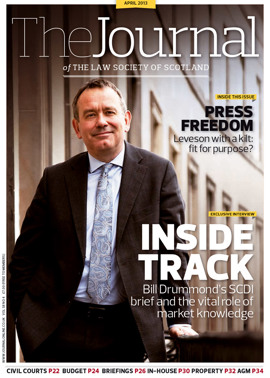Too far removed?

Collateral matters
A five judge bench was convened in CJM (No2) v HM Advocate [2013] HCJAC 22 (14 February 2013) to consider whether the judges at a preliminary hearing and at trial had been correct in refusing an application under s 275 of the Criminal Procedure (Scotland) Act 1995, to allow evidence and questioning of a complainer in relation to an allegation of sexual assault which had been retracted and had led the complainer to be charged with wasting police time.
The appeal court was unanimous in holding that in this case, which involved historical allegations of sexual offences against children, the charge involving this complainer covering the years 1994 to 1998 when she was aged between six and 10, evidence of the retracted complaint made at the time of an incident in 2006 was a collateral matter. Since the evidence sought to be adduced was inadmissible at common law, it had rightly been excluded. Sections 274 and 275 of the 1995 Act are designed to further exclude matters relating to a complainer’s sexual history.
The rule excluding evidence of collateral facts was reiterated, subject to the exception relating to “instantly verifiable material which cannot be challenged”, for example, a relevant previous conviction.
In the present case it was noted that, while the complainer had been charged with wasting police time, she had not been prosecuted, far less convicted, and it seemed that the circumstances in which she retracted allegations made were not totally clear.
In any event, there was a considerable gap in time between the charge before the court and the date of the allegation. The two sets of circumstances were entirely different in that the former involved the repeated sexual abuse of the complainer by a relative when she was a child, whereas the 2006 allegation was made when she was 17. The charge before the court had arisen when the complainer made disclosures at the age of 21.
For the appellant it was asserted that it had to be determined whether the allegation made by the complainer fell within the definition of sexual behaviour, and here it was simply a statement made to the police, albeit containing lies about sexual behaviour. It was sought to be shown that the complainer suffered from a condition or predisposition, within the ambit of the exception set out in s 275.
The appeal court rejected these arguments on the basis that the statement was inadmissible at common law.
The court did not preclude the possibility of a successful application being made to put false allegations by the same complainer of a similar nature to the charges involving an accused. Lord Clarke and Lady Cosgrove did not consider this should be limited to a conviction for wasting police time or the like. Any such allegations raised would however have to be considerably less remote than in the present case. At para 51 Lord Clarke sets out the matters which would require to be considered. He also warns against the term “collateral” being used too readily in circumstances where the exclusion of evidence might be unfair.
Concert
DSP v HM Advocate [2013] HCJAC 16 (6 February 2013) has some helpful guidance on the question of concert. The appellant was one of five persons indicted for murder. A co-accused was convicted of murder and the appellant of culpable homicide. The jury had clearly been satisfied that the co-accused had used the knife to inflict the fatal wounds. There was no evidence that the appellant had used a knife against the deceased, and the question was whether there was sufficient evidence to conclude that the appellant was acting in concert in the knowledge that a knife was to be used or was being used in the attack.
The deceased had given a statement to police about an earlier incident, in which he implicated the appellant. Subsequently the deceased had been taunted at school for being a “grass”, and the appellant had threatened to stab him.
There was evidence of the appellant and others travelling to the locus with intent to assault the deceased; that the deceased’s father had been confronted by the appellant who threatened to stab him and burn down his house; that the appellant and the co-accused convicted of murder had attacked the deceased at the same time; and that the appellant continued the attack after his co-accused had left, by which time the deceased was fatally injured and bleeding. The appellant was heard to shout: “He’s a grass. He deserves what he gets”, and threatened the deceased’s parents. The co-accused had been seen secreting a knife up his sleeve before he had left with the others.
The appeal court relied on the test for concert set out in McKinnon v HM Advocate 2003 SCCR 224. It concluded that the evidence of what happened once the attack was over could properly be regarded as casting light on the attitude of the appellant at the time of the attack. Accordingly, the trial judge properly repelled a submission of no case to answer. No criticism was made of the judge’s charge to the jury and, in light of the discriminating verdicts of the jury, the court did not consider that a miscarriage of justice had occurred.
This case is helpful in the way that both the appellant’s and the Crown’s arguments are summarised in a series of bullet points and provide a template for how parties should approach the question of concert at trial.
Cadder: young accused
While the number of Cadder-type appeals appears to be diminishing as a result of successive decisions, the issue was raised in McCann v HM Advocate [2013] HCJAC 29 (4 May 2012; uploaded 5 March 2013), following the lodging of preliminary issue and devolution issue minutes.
Challenge was taken to the police interview on the basis that the appellant had been 16 years and 41 days old at the time of his detention and interview, and had been under the influence of valium at the time.
The sheriff had heard evidence and submissions before ruling on the matter. Police evidence was to the effect that charge bar procedures had been carried out, during which the appellant had not wished intimation of his detention sent to a lawyer, and had indicated he was not under the influence of drink or drugs. He was taken through the Solicitor Access Recording Form (SARF) and had declined a telephone conversation with a solicitor or a personal consultation.
At the start of the interview, he was cautioned and asked to explain whether he understood its terms. He indicated that anything he said would be taped and “kept in evidence”. He indicated he was aware that he didn’t have to answer any questions. He confirmed that he had earlier declined the services of a solicitor.
The sheriff accepted the evidence about the repeated offers of access to a lawyer, and that the appellant’s waiver of his right of access to a lawyer had been “unequivocal”.
Since the appellant had not been under 16 at the time of interview, his parents or carer had no rights of access. The police could have considered the appellant in need of an appropriate adult, but did not do so in this case. It was asserted that the appellant was “not very bright”, but the court held that there was no evidential basis that he lacked the intellectual capacity or maturity to make an informed decision. The case in question was a simple allegation concerning a recent robbery, and the sheriff had been entitled to hold that the Crown had established a valid waiver on the part of the appellant. The appeal was refused.
Cadder: old case
In this context, the recent Court of Session decision in Gordon v Scottish Criminal Cases Review Commission [2013] CSOH 13 (24 January 2013) is of interest. The petitioner had been convicted of rape in 2002 and his appeal against conviction on other grounds had been refused in 2004. Application was made to the SCCRC, and the matter was referred back to the High Court as it was believed a miscarriage of justice might have occurred due to the cumulative effect of police “enquiry errors and other irregularities”. An appeal on those grounds was refused in 2010 and leave to the Supreme Court was refused.
A fresh application for review was sent to the SCCRC in 2011 in relation to forensic evidence, but this was expanded to include a reference to his police interview in light of the decision in Cadder v HM Advocate [2011] UKSC 13. This application was refused, and the petition was lodged seeking judicial review of that decision. At trial and in previous hearings, the appellant had not sought to deny what he had told the police at interview, including that he had had consensual sexual intercourse with the complainer. He had relied on the statement at trial and not given evidence. Lord Pentland was of the view it would be “repugnant to the interests of justice” if the petitioner were permitted to exclude uncontested evidence that was essential to proof at trial, and the petition was refused.
Lord Rodger had made it clear in Cadder that the effect of that decision should not have a bearing on past convictions
In this issue
- Fifty shades of lay?
- Employee owners: a view from across the Pond
- All change
- EIAs: increasing the impact
- Mooting comes to Strasbourg
- Reading for pleasure
- Opinion column: Elaine Sutherland
- Book reviews
- Profile
- President's column
- Minimise the risk of rejection
- Helping with enquiries
- Path to growth
- New starts for all?
- Leveson: alarm bells
- McLeveson: still in balance
- From Gill to Bill
- A Budget for aspiration?
- Too far removed?
- Enough to send you to sleep
- Interest on damages: what rate?
- Scottish Solicitors' Discipline Tribunal
- Let's get personal
- Good hedges make good neighbours
- Sep rep: on to the rules
- Ask Ash
- Change management for lobsters
- How not to win business: a guide for professionals
- Keeping errors in check: 2
- Wills at a distance
- Law reform roundup
- Make the survey count






